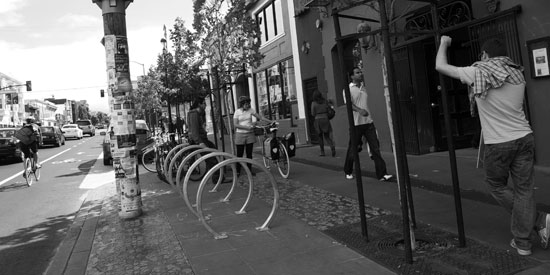
Revenue from the vehicle registration fee would go to funding projects like the new Valencia Streetscape Project. Photo by Colleen McHugh.
What it does
This measure would add $10 to current vehicle registration fees to fund congestion and pollution mitigation projects and programs.
If approved by voters, the fee will generate an estimated $5 million per year. These funds will be administered by the San Francisco County Transportation Authority in its role as the county's congestion management agency. Under the law that authorizes it to place the fee on the ballot, the SFCTA was required to develop a plan for how it would spend the revenue from the new fee. The plan indicates that the fee will fund programs that aim at a number of goals:
- Repair and reconstruct local streets and roads"”with priority given to streets located on San Francisco's bicycle and transit networks, and to projects that include "complete streets" elements such as curb ramps, bicycle infrastructure, pedestrian improvements and traffic calming.
- Increase the safety and usability of streets for pedestrians, by implementing crosswalk improvements, sidewalk repair and widening, corner bulbouts, and pedestrian lighting and signals.
- Make public transportation more efficient, reliable and accessible through measures including transit station and stop improvements, transit signal priority, travel information improvements, innovative parking management pilot projects and transportation demand management.
The SFCTA board resolution regarding Prop. AA notes that no more than 5 percent of the revenue from the fee can be used for administration, and stipulates that 50 percent of the revenue will fund road repairs, 25 percent will fund pedestrian safety improvements and 25 percent will fund transit upgrades.
The fee has no sunset and can be increased only through action by the California Legislature and subsequent vote of the people of San Francisco.
Why it's on the ballot
In 2009, the California Legislature passed Senate Bill 83, which made way for California's congestion management agencies to place a $10 vehicle registration fee on the ballot to help fund their pollution and congestion mitigation efforts. The legislation requires each agency to prepare an expenditure plan before going to the voters, and also requires that the fee support the agency's mitigation goals and that the programs benefit those who pay the fee.
The SFCTA conducted a planning process with a citizen advisory committee to develop guiding principles that informed the Prop. AA expenditure strategy:
- Provide a documentable benefit or relationship to those paying the fee.
- Limit the expenditure plan to a few programmatic categories, given the relatively small revenue stream.
- Focus on small but high-impact projects that will provide tangible benefits in the short term.
- Provide a fair geographic distribution that takes into account the needs of San Francisco's neighborhoods
- Ensure accountability and transparency in programming and delivery.
The San Francisco Board of Supervisors, acting in its role as the board of the SFCTA, approved the expenditure plan 8-3 and sent this measure to the people. (More information on SB83 and the SFCTA's expenditure plan) This measure requires a simple majority to pass.
Pros
- This measure brings much needed revenue to a set of projects that support San Franciscans' desire for more efficient, environmentally friendly transportation system.
- Although a modest sum in the overall spending for transportation projects, this measure brings a steady and reliable funding source to improve and maintain San Francisco's transportation infrastructure.
- This measure can help discourage people from driving by both increasing the cost of car ownership and by improving the infrastructure of alternatives. Seven of the nine Bay Area counties will or are likely to have similar measures on the November ballot. This should ease concerns of San Francisco being at a competitive disadvantage.
Cons
- This measure requires that the funds directly benefit those who pay the fee. While the proposed fee is solely paid by San Francisco residents and businesses who own motor vehicles, at least 50 percent of resulting fees will be allocated to transit and pedestrian improvements that arguably do not benefit motorists.
- As with all flat fees and taxes, this measure disproportionately affects low-income vehicle owners.
- The measure provides only a small sum of money to meet critical infrastructure needs. This fact both ignores broader funding challenges and gives the public a false sense that the need is being met.
- This measure does little to directly affect congestion or commute behavior, taxing the owners of vehicles registered in San Francisco in lieu of those commuting during peak hours. Increasing one-time or annual fees such as this will likely have minimal impact on commute behavior.
SPUR's analysis
SPUR continues to advocate for the allocation of substantial funding for public transit, pedestrian and bicycle infrastructure, and transit-oriented development throughout the region.
This measure is a worthy effort to bring a modest, consistent and needed revenue stream to set of projects and programs that will result in short-term improvements to San Francisco's transportation infrastructure.
We appreciate that the enabling legislation called for an expenditure plan before going to the voters and that the SFCTA went through a diligent planning process that provided sound guiding principals that call for tangible benefits in the short-term.We hope the SFCTA and the implementing agencies will be able to deliver this ambitious element of the plan.
Our largest concern is that in spite of the relatively small amount of money this measure generates, voters may have a false sense they have solved the problem of transportation funding. Despite this concern, there is a strong need for a consistent funding stream for road improvements, and pedestrian safety and transit upgrades.
SPUR recommends a "Yes" vote on Prop. AA.